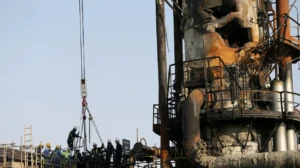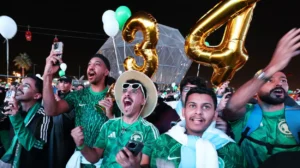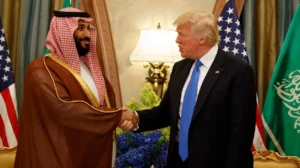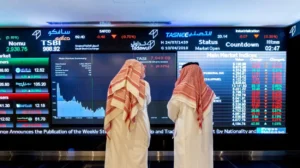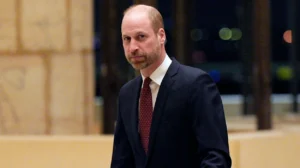- Home
- Why Boycott?
- Human Rights Violations
- Migrant Workers Exploitation & Kafala System Abuse
- Saudi Arabia’s War Crimes
- Freedom of Press and media censorship
- Torture And Unfair Trials
- Saudi Arabia’s Anti-Climate Agenda
- Bogus Stadium Infrastructure
- Sportwashing & Political image
- Saudi Arabia’s Unfair bidding Process
- FIFIA Corruption and Transparency issues
- Poor Treatment of LGBTQ community
- Security risks for spectators
- News
- Get Involved
- Contact Us
Sportswashing
FIFA World Cup 2034: Is Saudi Arabia Using Sportswashing to Clean Its Image?
With teams participating from all over the world, the FIFA World Cup is among the most reputable sporting competitions. It marks soccer, solidarity, and the competitive spirit. The choice to grant the hosting rights for the 2034 FIFA World Cup to Saudi Arabia, though, has ignited much debate. Saudi Arabia’s bid, critics contend, is a case of “sportswashing’’. It is when nations use big sports events to divert attention from human rights violations, political repression, and other unethical behaviors. This blog will explore why sportswashing renders Saudi Arabia a bad host for the FIFA World Cup 2034.W
Top Reasons Which Make Saudi Arabia an Unfit Host
Worldwide, FIFA’s choice to give the 2034 World Cup to Saudi Arabia has ignited outrage. Many commentators argue that FIFA has yet again chosen financial gain over ethics, decency, and fundamental football values. Saudi Arabia’s offer has been generally regarded as a sportswashing campaign, whereby oppressive governments use sports to polish their international reputation. But under the glamour of football lies a country known for human rights violations, LGBTQ+ repression, gender inequality, censorship, and worker exploitation. Here’s Why boycott the Saudi 2034 FIFA World Cup:
1. Worst human rights history Record
Regarding human rights abuses, Saudi Arabia is among the worst offenders. The 2023 Freedom House Report rates the nation 8/100 in global freedom rankings, therefore classifying it as an oppressive state with strong restrictions on civil rights. Main rights violations include:
- Since 2015, more than 1,000 executions have taken place—twice the rate of previous years, Amnesty International says.
- Regarding political opposition, Saudi Arabia put 81 people to death in a single day in March 2022, many of them sentenced for protesting the government.
- Human Rights Watch states that at least 30 journalists and campaigners are now incarcerated, several of them under appalling circumstances.
- Though FIFA has voted the World Cup to a nation that regularly breaks these precise ideals, the organization purports to symbolize human rights and equality.
2. Gender inequality: A major concern
Although Saudi Arabia has made small changes like permitting women to drive (in 2018), these are mostly symbolic. Many aspects of women’s lives are still governed by the strict male guardian mentality of the country. Gender Discrimination by the Numbers:
- UN Women stated that women must have male approval to marry, travel, and use medical facilities.
- Cultural constraints keep just 16 percent of Saudi women from engaging in sports.
- Establishing the Saudi Women’s Football League (est. 2020) There is no female leadership and there is not enough financial support.
- Though FIFA encourages women’s soccer, it has picked a host nation where women players and fans would meet institutional bias.
- For fans, athletes, and personnel of the LGBTQ+ community, persecution will be encountered.
3. Lack of LGBTQ+ Rights and Criminalization of Homosexuality
Saudi Arabia is among eleven nations in which homosexuality carries a death sentence (ILGA World Report 2023). Just being LGBTQ+ in Saudi Arabia may create:
- Imprisoning, corporal lashings, or death
- More than 100 instances of LGBTQ+ arrests have been reported. 2020-2023
- Torture and coerced confessions of imagined LGBTQ+ victims
- Past LGBTQ+ discrimination during the 2022 World Cup in Qatar caused worldwide indignation; Saudi Arabia will be even more distant in 2034.
4. The murder of Jamal Khashoggi: Lack of freedom of speech
Inside the Saudi consulate in Istanbul in 2018, Saudi reporter Jamal Khashoggi was savagely slain. Based on United States Crown Prince Mohammed bin Salman (MBS) sanctioned the mission in Intelligence Reports. FIFA 2034 Why This is Important:
- Since 2015, Saudi Arabia has jailed more than 80 journalists.
- Independent news reports will be severely limited, thereby affecting honest media coverage of the event.
- Though FIFA has become bonded with a government that murders reporters, it claims to back free speech.
5. Migrant Laborers Subjected to Violence
Built on the shoulders of migrant laborers, the 2022 Qatar World Cup was established.
- The Guardian reports that more than 6,500 workers from India, Pakistan, Nepal, Bangladesh, and Sri Lanka perished as a result of heat stress and hazardous working conditions in 2021).
- Employers kept back wages for several months, so their employees were under great financial stress.
- The Kafala process that Saudi Arabia uses is the same as Qatar’s. Per Amnesty International:
- Under circumstances denoted as modern-day slavery, Saudi Arabia has over 10 million immigrant workers.
- 80% of labor violations go under the fear of expulsion or jail.
If labor rights are not well enforced, the 2034 World Cup might resemble the catastrophe suffered by Qatar.
6. Environmental Damage and Unsustainable Development
Because of Saudi Arabia’s desert climate, it is one of the most inappropriate nations for a World Cup. There are many environmental problems in the desert. Crucial environmental issues:
- In the hot season, temperatures over 50°C (122°F) are treacherous for supporters and athletes. The KSA climate is extreme and is not suitable for many people.
- Stadiums in a water-stressed nation will consume billions of gallons of water to be kept.
- Being the world’s second-biggest oil producer, Saudi Arabia’s sustainability arguments are hypocritical.
- Qatar’s supposed carbon-neutral World Cup of 2022 was a farce. The impact of Saudi Arabia on the world will be even more negative.
7. Sportswashing: Using Football to Distract from Atrocities
The aggressive sportwashing initiative of Saudi Arabia is aimed at hiding its human rights performance. Numbers on Saudi Sportwashing:
- $6.5 billion was spent in the Saudi Pro League to acquire top talent such as Cristiano Ronaldo, Neymar, and Karim Benzema.
- $2 billion on LIV Golf, which interrupts the PGA Tour.
- Formula 1 sponsorships had a $650 million investment.
- While hosting the FIFA World Cup Finishes Saudi Arabia’s PR transformation, the people should not be deceived.
8. Lacks football legacy and infrastructure
Saudi Arabia does not have a well-established soccer culture, unlike football giants such as Argentina, Germany, or Brazil. Although the country has welcomed Formula 1, WWE, and boxing matches, its football league is propped up by money. Although a World Cup should leave a long-lasting football heritage, Saudi Arabia’s strategy is more on reputation management than on actual growth. Countries with genuine football passion and strong grassroots programs would make better hosts.
- Saudi Arabia has none of the former hosts including Germany, Brazil, or even Qatar.
- A top domestic league (much dependent on overseas players).
- The culture in football is similar to that of South America or Europe.
- Most will be constructed from the ground up, which will just let more abuse of labor.
- Money can purchase superstars, but not football history.
9. Yemen War Atrocities: Questionable Acts
Since 2015, Saudi Arabia has been participating in a fierce conflict in Yemen that has resulted in one of the worst humanitarian catastrophes in recent history. Important Points to Know about Saudi War Crimes:
- Human Rights Watch reports that Saudi-led strikes have killed thousands of civilians, many of them children, often aimed at hospitals, schools, and residential districts.
- Saudi forces had committed war crimes, including random bombings and the use of banned arms such as cluster bombs, according to a United Nations report from 2021.
- The Saudi-led blockades, in part, have caused 17.4 million Yemenis to suffer from serious food insecurity and over 4.5 million people have been displaced by the conflict. Boycott Saudi 2034 FIFA World Cup.ALWAYS!
Western World Anguish
- Saudi Arabia persists with its military actions in Yemen in the face of worldwide criticism. FIFA is essentially honoring a nation accused of war crimes by giving the World Cup to Saudi Arabia, in opposition to FIFA’s own human rights promise. The terrorists from Saudi Arabia are also creating a lot of issues.
Will the 2034 World Cup Be Another Human Rights Catastrophe?
More than 6,500 migrant workers passed away constructing stadiums during the 2022 Qatar World Cup. Even worse are the labor rights in Saudi Arabia, which means thousands of employees could die or be subjected to abuse before 2034. FIFA should see to it no World Cup depends on current slavery.
10. Unjust Trials: Torture and silly court proceedings
Politically repressive Saudi Arabia has among the worst histories. Under unfair legal systems, the government frequently detains, tortures, and kills dissenters.
The Real Face of Saudi Arabia’s Legal System
- Saudi Arabia carried out 196 executions in 2022 alone, the most in modern times.
- Detainees in biderta centers will frequently be subject to beatings, electrocution, and sleeplessness.
- Political activists, journalists, and even theologians endure arbitrary trials without any legal representation. Prominent examples of torture and unfair trials
- Murder of Jamal Khashoggi (2018): Once inside the Saudi consulate in Istanbul, the Saudi journalist was slain. Though no high government official was held responsible, the CIA found that Crown Prince Mohammed bin Salman (MBS) ordered the murder.
- Women’s rights activist Loujain al-Hathloul was detained and tormented for supporting women’s right to travel. Released after three years in jail, she still lives under close supervision.
- Saudi Arabia carried out 81 executions in one day, some of which had been found guilty in private hearings without proper due process.
- Giving the World Cup to a nation that jails and tortures its citizens legitimizes the harsh governance of Saudi Arabia by FIFA.
- Growing demand for migrant worker labor helps to explain—though not to justify—companies’ use of exploitation.
- Like Qatar, Saudi Arabia depends on many migrant workers to construct its infrastructure, sometimes under abusive circumstances.
Modern-day slavery is the Kafala System
- Under Kafala, a sponsorship system, Saudi Arabia’s labor system runs.
- This links workers with their employers, practically ensuring they cannot quit brutal work.
- Confiscates passports which stops employees from going back home.
- Many workers go unpaid for months and wages are late—or not at all.
11. Worst Record of Human Migrant Exploitation
Mostly from India, Bangladesh, and Pakistan, Saudi Arabia has more than 10 million migrant workers.
- Amnesty International’s 2021 report says Saudi Arabia’s migrant laborers suffer forced labor, unpaid salaries, and cruel living conditions.
- As employees suffer temperatures above 50°C (122°F) with little shielding, heat-related fatalities are frequent.
Why FIFA’s credibility is on the line?
From the 2018/2022 Russia-Qatar bidding discretion to bribery instances under Sepp Blatter, FIFA has a long past of corruption episodes. FIFA’s 2034 ruling begs some questions:
- There was no competitive auction—Australia pulled out.
- Reports purport hidden corporate negotiations with Saudi Arabia.
- Sponsorship donations that could be withdrawn because of ethical issues particulates.
- This action shows that FIFA values money above ethics, therefore irrevocably destroying its reputation. There are wide reports on corruption in FIFA.
Why FIFA is Overlooking More Worthy Hosts?
There are no citizen’s rights in Saudi Arabia. FIFA fell upon Saudi Arabia in favor of others, turning away from better alternatives like:
- Australia: a developed country with a rich soccer tradition.
- Proven football hubs with top-class stadiums: The United Kingdom and Ireland.
- South Korea and Japan have top-tier facilities and co-hosted effectively in 2002. It clearly shows FIFA chose sport-waiving over merit.
Why Must FIFA overthink its decision?
We cannot turn our noses up on Saudi Arabia’s sportwashing. FIFA has to be pressured by human rights groups, sponsors, and fans to rethink. Football belongs to the people, not authoritative governments trying to boost their image. Before it’s too late, oppose sportswashing and insist on accountability.
FIFA Corruption: Money Over Ethics
FIFA’s decision to award the 2034 World Cup to Saudi Arabia came under suspicion due to the lack of a competitive bidding process. Critics argue that FIFA prioritized financial incentives over fairness, repeating the mistakes made by Russia in 2018 and Qatar in 2022.FIFA has suffered from a series of corruption scandals, among them:
- 2015 United States FIFA Corruption Instance: The U.S. Charged with receiving some $150 million in kickbacks connected with World Cup bids, 14 FIFA executives were prosecuted by the Department of Justice.
- Qatar 2022 Reports: Qatar was said to have paid $880 million through under-the-table agreements to guarantee hosting rights.
- Driven in part by fear of excessive influence, Saudi’s Public Investment Fund (PIF) has been spending billions of dollars on soccer.
Saudi Arabia’s doubtful association with FIFA
Saudi Arabia has been highly vigorously increasing its part in soccer, including:
- State-owned companies sponsoring FIFA events
- Signing deals with FIFA officials to procure influence.
- By organizing international competitions such as the Club World Cup, and trying to make its worldwide presence familiar.
- FIFA has further strengthened the idea that World Cup hosts are determined by funds rather than merit by awarding the 2034 World Cup without a clear bidding process.

